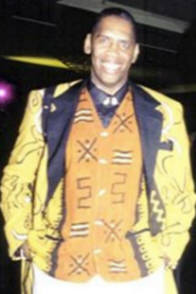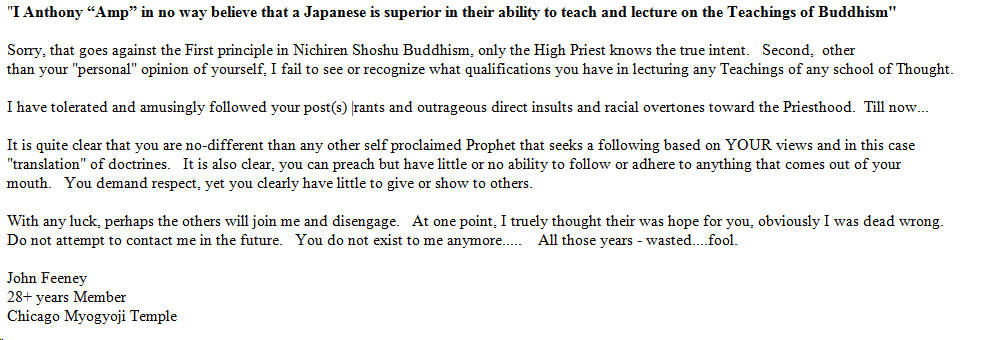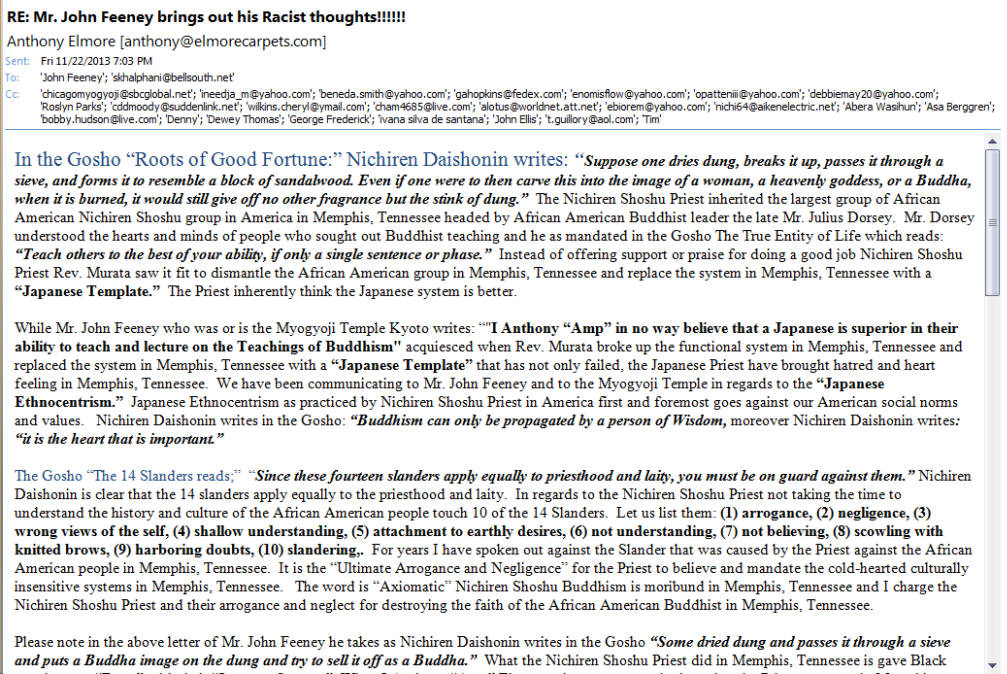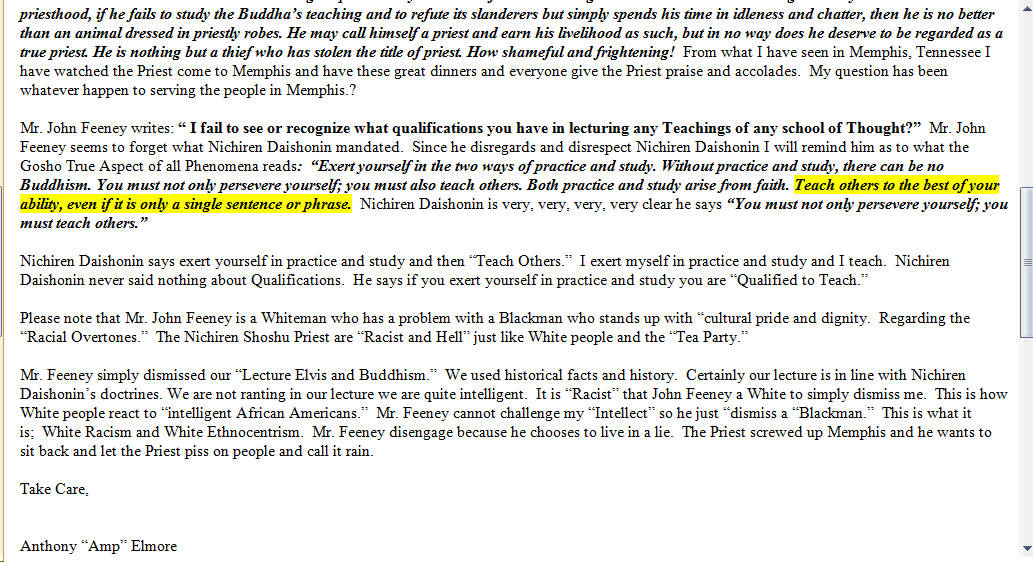
Introduction to Buddhism for African and African/American people
By Anthony "Amp" Elmore Sr.
The Nichiren Buddhist religion is a universal religion for all people. This writing is not official, sanctioned, authorized, encouraged or even suggested by a Nichiren Buddhist religious order. st Century. Today I call myself a Nichiren Buddhist. This writing is from the heart and mind of one single African/American who has practiced Nichiren Buddhism for 40 years and I do not claim to be an expert or authority on Buddhist teachings. This writing is only my personal insight into the character and nature of Buddhism as I have learned for the past 40 years.I claim not to be an expert on Buddhism, but I am an expert at being an African/American Buddhist and I feel I can share some insight of Buddhism to other African and African/American people. Earlier in life I was and SGI Buddhist. Later I became a direct Temple member of the Nichiren Shoshu Buddhist sects. Both the SGI and Nichiren Shoshu has some wonderful teachings and they are evolving. At the time of this writing I am learning Nichiren Shu Teachings that I find more accomodating and relevant to me than Nichiren Shoshu. The jury is still out and I am learning.
In one Nichiren publication I saw a Korean page, a Chinese page and somewhere I saw a Spanish page. At this time in Nichiren Buddhism there is no African or African/American Nichiren publications or writings. This is why we have this website. Also there is no African/American policy in Nichiren Buddhist sects. The Japanese who teach this religion view Americans as one homogeneous culture and their policy and approach to teaching Buddhism in America is based on teaching Buddhism for an American homogeneous approach. We hold that this lack of understanding of American culture by our Nichiren Japanese teachers is; ignorance, arrogance and neglectful. We at our website hold for the most part that many Japanese need a lesson in diversity training and a clear understanding of American culture and history.To add insult to injury we have a segment of African/Americans who practice Buddhism under Japanese teachers are in denial of racism in America and racism in Nichiren Buddhism. Our website challege Japanese Buddhist teachers to reform.
Anthony "Amp" Elmore Sr.
One African/American female Nichiren Shoshu member practicing in Washington D.C. indicated to me that she could not give an experience on this African/American Web Site because her Nichiren Shoshu practice has taken her beyond cultural, racial and political boundaries. There are many African/Americans who do not associate with African and African American culture and history. Although in the past I called myself a Nichiren Shoshu Buddhist I do have my cultural preferences that I take pride in. As a Black and proud African/American male I refuse to practice any religion whereas in the religion I cannot express my Black cultural heritage and history. I heard a concern that this African and African/American Web Site could possibly cause some racial division and some African/Americans are scared to express their cultural preferences. I make this point clear I am a Nichiren Buddhist and a proud Black Buddhist. At Tozan (pilgrimage) at a Temple in Japan, many racial and cultural divisions worship to the same object of worship the Gohonzon. The teaching of Nichiren Daishonin does not require any ethnic group to deny their cultural heritage. In fact this universal religion can manifest itself in the cultural model of any people.
This writer of "Introduction to Buddhism To Africans & African/Americans" cannot understand how anyone can suggest that a writing of Nichiren Buddhism by an African/American to other Africans could be a problem. The suggestion of teachings Ebonics to African/American students in the American school system caused a lot of concerns and controversy. On this Web Site Ebonics is encouraged. For the Japanese or white people who may read this article, Ebonics means speaking Black African/American English. Ebonics is not just words but also the Black attitude. This article "Introduction To Buddhism To Africans & African/Americans" is not about Ebonics but simply an attempt to introduce my sister & brothers or my homees to Buddhism. Homey is a Black term that the brothers & sisters understand, but if you do not understand about the brothers & the sisters you would not know about homey or what it means to give some skin or five this is all Ebonics. This website is not racial but an African/American cultural Nichiren Buddhist website. Right On Home!!!!
We call our site Proud Black Buddhist and we are Proud, Black and Buddhist. I am not trying to be White or Japanese. Let me be clear I am not racial I am cultural. I do not care for dominate Japanese culture because I am African/American. There are clearly cultural preferences that I have. Let me site an example; in 1999 I fought a Kickboxing bout in beautiful Hawaii. Every morning I would drive 30 miles to the Nichiren Shoshu Temple for morning prayers. The Nichiren Shoshu Temple in Hawaii seems to be almost 100% Japanese. I did my prayers each morning and I got along just fine, however it was just like being in Japan and I certainly did not enjoy the environment for extended time periods.
There is a Nichiren Shoshu temple in Accra, Ghana. There are over 1000 Africans practicing at this temple in Ghana I love practicing my faith in Ghana. I was a member of the Myogyoji, Temple in Chicago and it is difficult for me to practice my faith at that temple. When I was introduced to Buddhism in Memphis we practiced Buddhism in an African/American cultural environment and I enjoyed my practice better in a Japanese dominate cultural enviroment.
Please understand that I am Black and I have a difficult time understanding what Japanese are saying. I can imagine how difficult it is on guest when they come to a Buddhist meeting and they do not understand. In Memphis, Tennessee the Nichiren Shoshu Buddhist Priest stripped away all of the Black cultural integration of Buddhism from the meetings in Memphis. The African/American leader was; "Just as happy." I said to myself there is no way in the hell I would let any Japanese come to my home and city and take away my culture in the name of Buddhism. The Black leader called his actions "Faith." I called his actions "Foolish." All Black people stopped coming to the meeting in Memphis. I am Black, proud and now you know let me get to explaining the Buddhist faith Black style. We found the Nichiren Shoshu Priest to be racist or rather Japanese nationlist. Certainly the teachings in Nichiren Shoshu are Asian Ethnocentric. I would never bring African Americans into a dominate Japanese Ethnocentric enviroment. I do not support such things. I call for a "Cultural inclusion" and not "Japanese exclusion. Just yesterday November 22, 2013. White Kyoto Leader at the Myogyoji Temple in Chicago wrote these words to me in an and email.

This White Boy blocked his email, but I wrote him back anyway because I want other Black people to understand the racism that is happening in Buddhism. Japanese and Whites do not believe in Black Equality. Read my reply below.
If you read these letters you can understand why I as an African American is not about go the the Nichiren Shoshu Myogyoji Temple in Chicago. I would never subject my family, friends or anyone to such a Buddhist enviroment. These Japanese Priest and White people are "Racist." They expect an African American to take their nonsense.

